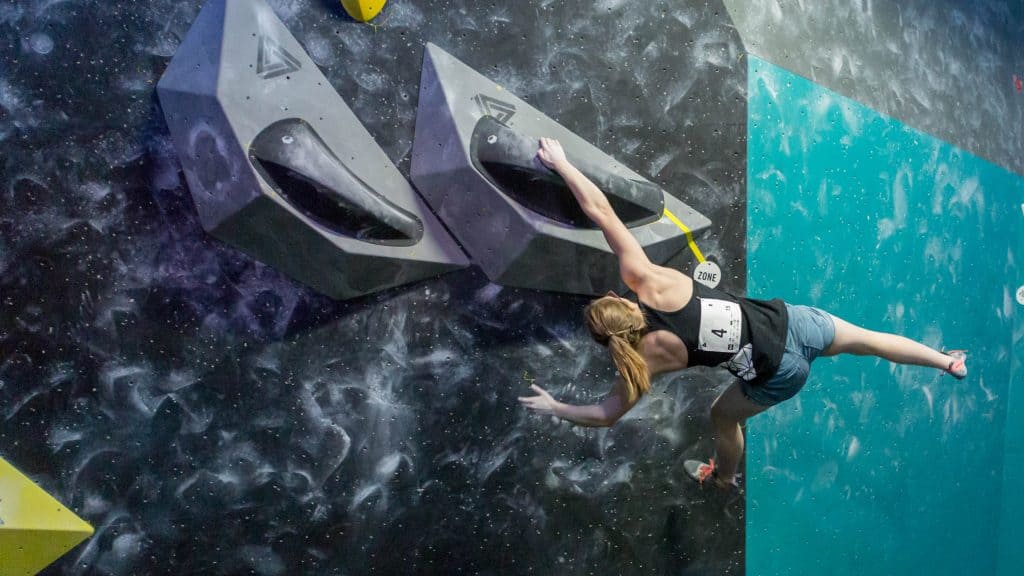
I grew up at a very unique point in time. I suspect historians will one day describe it as the takeover of social media. Instagram and Facebook defined the formative years of millions of kids looking to grow up in a world ruled by technology. However in December of 2018, I deleted my Instagram and Facebook accounts, and quite honestly think it was this decision that allowed me to attain the biggest achievement of my climbing career to date – the podium at Canadian Open Boulder Nationals.
History
I was an early adopter to Instagram. I vividly remember being on the bus in grade 5 when my friend showed me her Instagram account for the first time. I downloaded the app that day and spent the next few months discovering what an online presence was. Cat photos were about all my 10 followers got every week, but when I discovered climbing a few years later, my Instagram became something I really cared about. Now there was something meaningful to post. Now I had a story.
Projecting videos turned to competition photos turned to a daily output of content. My climbing career progressed and with every incremental step forward, there was my Instagram account following along with me. I developed a sizable little following and spent hours a day scrolling through my feed commenting, liking photos, and exploring. As I thought popularity demanded, I put in place every possible tool to nurture engagement with my account. I had a business profile which allowed me to see statistics on my following. I had a separate phone for social media. I could see what demographics my followers belonged to, when they’re typically online, for how long, and what the ideal time of day is to post. I had a content calendar synced to my Google account to keep me consistent. I put aside days to generate content for later use. I had it dialed.
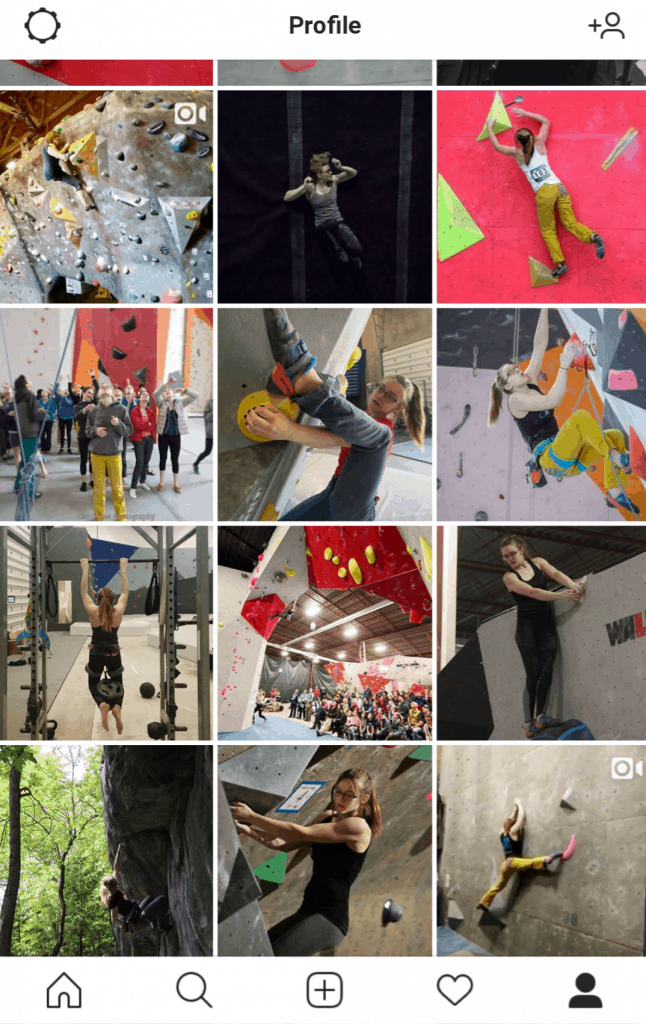
Competition posts got the most engagement. I would treat the caption as an opportunity to relay some wisdom to my audience, while subtly throwing in a hint about my placement. People say such nice things after you excel in competitions. They give you validation for looking strong and trying hard. I remember how elated I was when I checked my phone after one competition. @cdnclimbingnews mentioned you in their story! @grippedmagazinecomps commented on your post! 200 likes, 30 comments, 5 mentions, 4 tags, it was the best part of the weekend… I wanted the congratulations. I wanted admiration. I wanted my follower count to grow. I wanted everyone to envy my life and achievements. I wanted, no, needed people to tell me I was going places.
And in this confession I saw the problem. The problem that didn’t look like a problem. The problem I didn’t want to be a problem. The problem that needed to be addressed.
I was addicted to social media.
But you can’t blame me. It’s so easy, so stimulating. It’s not even a statement that you have Instagram, it’s assumed. Everyone’s doing it.
Props to you, Instagram. You really got me, and the rest of the world for that matter. You allowed me to play celebrity for over a year, and I was unaware of the destruction you were silently perpetrating.
Identifying the problem meant the floodgate of reality came pouring into the light. I began to take notice of how social media influenced me and my climbing goals. I saw that I was intimidated by training posts from my competitors, it made me doubt my own program. I felt my drive to succeed was the positive-reinforcement, not self-satisfaction or personal growth. I was paranoid about my dynamic follower count. Was there a reason people unfollowed me? I felt as if there was a secondary competition taking place between myself and my competitors over who had the biggest, most popular Instagram profile – and I was losing. I was upset over any dry-spell in post likes or views. I spent too much time on Instagram, even on my own profile, admiring my feed like a wall of trophies. My content was misleading, I’d often post items to my profile claiming they were taken that day when in fact I stockpiled them months prior. I caught myself being exceedingly judgmental of people. I edited pictures beyond recognition. Need I go on?
Yes. Let’s not dismiss that obvious egotism I was demonstrating. I cared so much about what everyone thought of me that it became outsourced confidence. I told the story of Madison in the brightest light possible and the reception to this augmented reality was, or course, quite positive. What’s worse is that I started believing this narrative of a girl who goes competition to competition with her head held high, steadily progressing without an end in sight, and living the dream travelling around the world to compete while finding the time for school, work, and a relationship. This story blinded me to the many mistakes I had along the way. I couldn’t step out of the reputation I forged online so I lived in a world of entitlement. Pride in my accomplishments made me content, and contentedness is poison to a young athlete who has to stay hungry if she wants to stay competitive.
Recovery
I knew something had to change. Admitting there was a problem wasn’t enough for me. It couldn’t be. So for the next six months, I phased out Instagram and Facebook until one day last December when I finally clicked, “Delete account”.
My first move was simply unfollowing people I knew would produce content that would hinder my mentality for the day. These were competitors and accounts that would post about them. This worked well for a while, until I found myself on the Explore page, and there they were again. And so, I deleted the app. Instagram was still installed on my social media phone so not having it on my everyday phone meant I was on it less but could still post. This may seem like a huge step forward, but it was really just a hoop to jump through because I cheated. A lot. Whether it was by googling “Instagram” and scrolling on the online version, re-downloading the app, or going onto my social media phone without the intention of posting, I was still constantly on Instagram. But you have to understand, I needed to check in on Instagram. Maybe someone commented something. Maybe I got a direct message.
Maybe there was something useless to look at. Maybe I needed to indulge my ego. Maybe I wanted to keep sabotaging myself. That’s definitely worth it.
So I tried something new. In September, I went to the profile of each account I was following and muted their posts and stories. This meant my feed was nothing but a white screen. Not seeing the people I was following transformed the app experience. I compare it to the act of buying something with a card opposed to cash. With cash, you see your money depleting, you feel the loss of funds. However with a card, it’s easy to be detached and spend money without even noticing it’s depletion. With money, this can be a drawback, but with social media I’m all for it. I didn’t see the impact of contributions when it felt like no one was there. I just posted. It was so easy to get the job done without playing too hard into my ego or getting caught battling for popularity because it was just me on Instagram.
At this point, as detached as I was from the app, I still felt chained to it. I had to post. I felt obligated to stay social for my sponsors, but at least the enjoyment was fading. As more and more time elapsed between my last check ins on Instagram, I felt more apathetic towards everything. My routine of posting became a chore – consistency was the only thing that kept me looking active. Comments were flattering, but monotonous, and my dispassion began to come through in my captions.
The last ties I had to Instagram were my sponsors. I thought I needed to be online for them. I thought I needed to continue indulging my ego with every tedious post and wear hashtags at the end of each caption like badges of honour. I thought the only way to stay relevant, stay supported, was to stay online. But then a friend of mine forwarded me an email by Cal Newport “On Bryce Harper and the Impact of Social Media on Athletes”. One line particularly caught my attention:
“At the elite level, athletes differentiate themselves by maximizing every physical and cognitive advantage”
If ‘elite athlete’ was a label I hoped to categorize myself under, then why the hell was I letting social media hold me back? Was I not willing to do everything it takes to achieve my highest potential in this sport? That thought didn’t sit right with me. With that reading, I realized I was ready to differentiate myself. Social media is a hindrance, and doing something in this sport requires pulling out all the stops and implementing everything in my power to achieve my goals. In Ben Bergeron’s Chasing Excellence, this idea is highlighted. Bergeron asks any athletes looking to achieve such a status to pose this question to themselves:
“Am I committing everything to make myself the tiniest percentage better than I am right now?”
If not, then you must be content with mediocrity, and I just couldn’t be.
In December of 2018, I stood ready to lose my every sponsor I had in the pursuit of something bigger. Maybe it wouldn’t have to come to that, maybe it would. Nonetheless I decided that getting more out of training and improving my head game was far more valuable a tool than any sponsorship could provide. So I deleted Instagram. I deleted weakness.
Life Unplugged
My exit from social media was a quiet one. There was no big, “I’m leaving and here’s why” post, no warning, just silence. Silence is incredibly valuable and incredibly rare, but until deleting my Instagram, I never realized just how freeing it is. To go to another country and not constantly be looking for photo ops, to have an excellent training session and not instinctively report it to the world, to go about life without the clouds of competition, notoriety, and pressure to achieve hanging over my head is so worth any possible case you can make for Instagram. Emancipation is truly blissful.
I saw myself slowly embodying exactly what Ryan Holiday preaches – successful people deliberately keep themselves out of the spotlight and subside without its validation. It keeps them sober, doing their jobs. So in deleting social media, I asked everyone to forget about me. Recognition isn’t what keeps me going these days. There’s nobody I’m here to perform for, I just train and silently work on achieving my own definition of success.
Deleting social media had many unexpected impacts on different sectors of my life, most notably being my character. The action proved to myself that I was committed. I showed myself that I was all in, so when something else comes up, a sacrifice I need to make, I am confident I’d be willing to take it on. I cultivated a list of attributes that are essential to athletes. My willingness to change habits demonstrated growth-mindedness. The passion I have for climbing was reaffirmed considering a source of satisfaction was eliminated. I had to reevaluate why I love what I do. Dedication was also apparent in my actions. I also found I was happier. There was no stress over posting or cheating. Training sessions were more focused, I could now stay in the zone a lot longer when I’m not constantly reaching for my phone. Even outside of climbing, I was less judgmental of people and oddly enough I think I became more social. Seeing as my only social interaction with people is in person, the only way to get to know people is to be vulnerable, face-to-face, not hiding behind a screen.
And this brings us to Open Boulder Nationals. Nearly 3 months off the grid, I find myself getting off a very successful end to my training cycle, more mentally prepared than I’ve ever been for any competition. In the past, this is where I’d do a pre-comp post saying “I’m off to Nationals, looking forward to it blah blah blah…” so followers would wish me good luck and all that. Then I’d tell everyone at the gym that I was leaving at the end of my last training day and head home where I would await special treatment considering “It’s Nationals weekend”. But this time, that didn’t happen. I wanted to keep to myself for once. Looking back, I’m very grateful that I didn’t fish for any last words of wisdom from my teammates, and didn’t I expect to be treated differently considering I was going to Nationals as a returning finalist. I didn’t think last year’s finish was a reason for people to watch out for me. If anything I assured myself that everyone in the room was very capable of beating me. For me, I boiled the competition down to its very core – an event out of town. It was just a weekend to do something fun. I didn’t want to make it a big, impressive event, so I was silent.
To drive this point home, I’ll tell you that my closest friends didn’t even know I was going to Nationals.
What’s interesting is that going to the event felt like another training day. In addition to downplaying its significance, I also wasn’t following the hype – preparation posts from the gym, competitors at the airport – the pressure was gone. Absolutely gone, and that enabled me to be excited for the event in such a genuine way, something I haven’t experienced since I started competing. It was so simple back then. Back when I didn’t have a resume of achievements in climbing, I was a nobody with nothing to prove and everything to gain. The goal was always to go out there, have fun, and try your best. Win or lose, everything will be okay. Success (and social media) thought this mindset needed to adapt, so winning turned into an expectation and losing became synonymous with failure. After deleting social media, I’ve come back to the mindset that allowed me to succeed in the first place. I was once again excited to be at a competition and my expectation was to leave everything on the wall – no pressure for results or public humiliation in defeat because win or lose, it will always be okay.
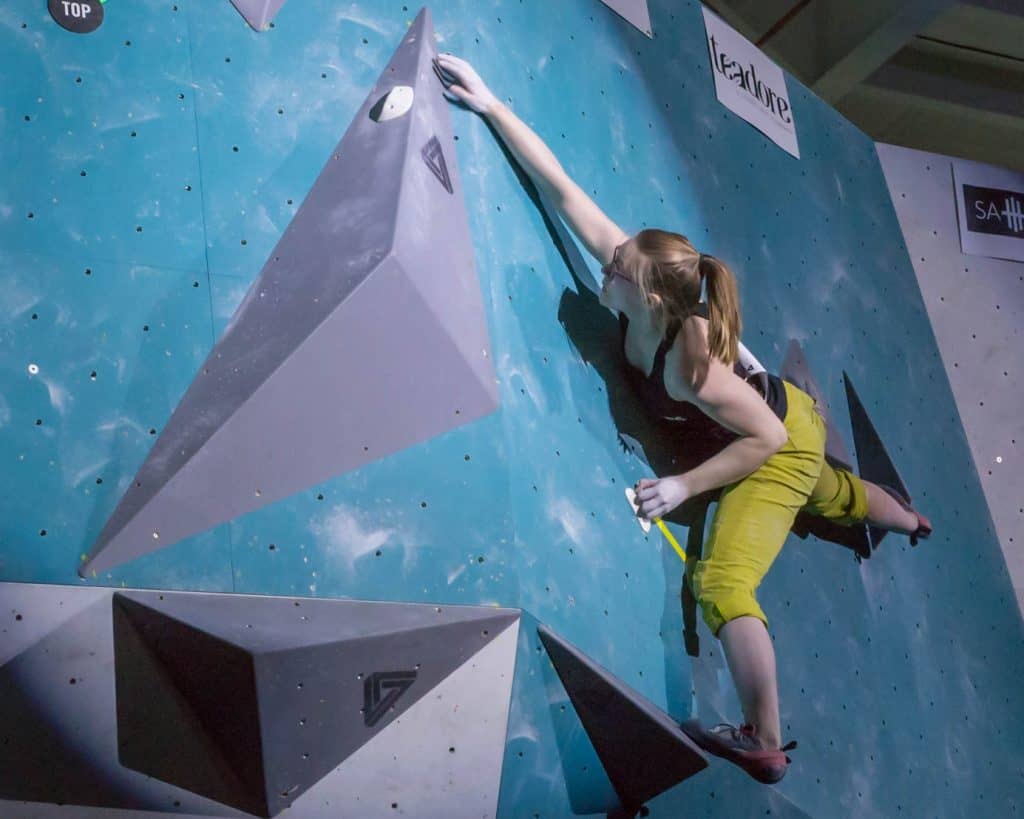
This mindset carried me from qualifiers to finals. In what could have been a disappointing comp tainted by pressure and over-confidence, I found my self in a state of overwhelming ease, able to perform at my capacity. Everything that I cultivated in the last 3 months – humility, positivity, confidence, focus, commitment – it all converged at Nationals. In my eyes, deleting social media was a declaration that I don’t care about what people think or say about me. I had to ask myself why I train, why I compete. If not for the congratulations, recognition, status, reputation, if not for the podium, then why was I there? The answer was clear – I wanted to see what I could do. Nothing to do with you, or your friends, or the neighbours, or the members at my gym, or my competitors, or family. It was all within, as it should be, and as it has to be.
My hope is that after this article you evaluate the role of social media in your life. At the very least, identify how it limits you, because it does. For those of you that take training and climbing seriously or want to, you need to consider whether you’re willing to do everything it takes to get to the elite level. Not everyone is a genetic masterpiece, so the rest of us need to pull out all the stops if we want to make a name for ourselves. And hey, even if it never pans out, at least we didn’t waste time scrolling and actually pursued an opportunity that may never come again.
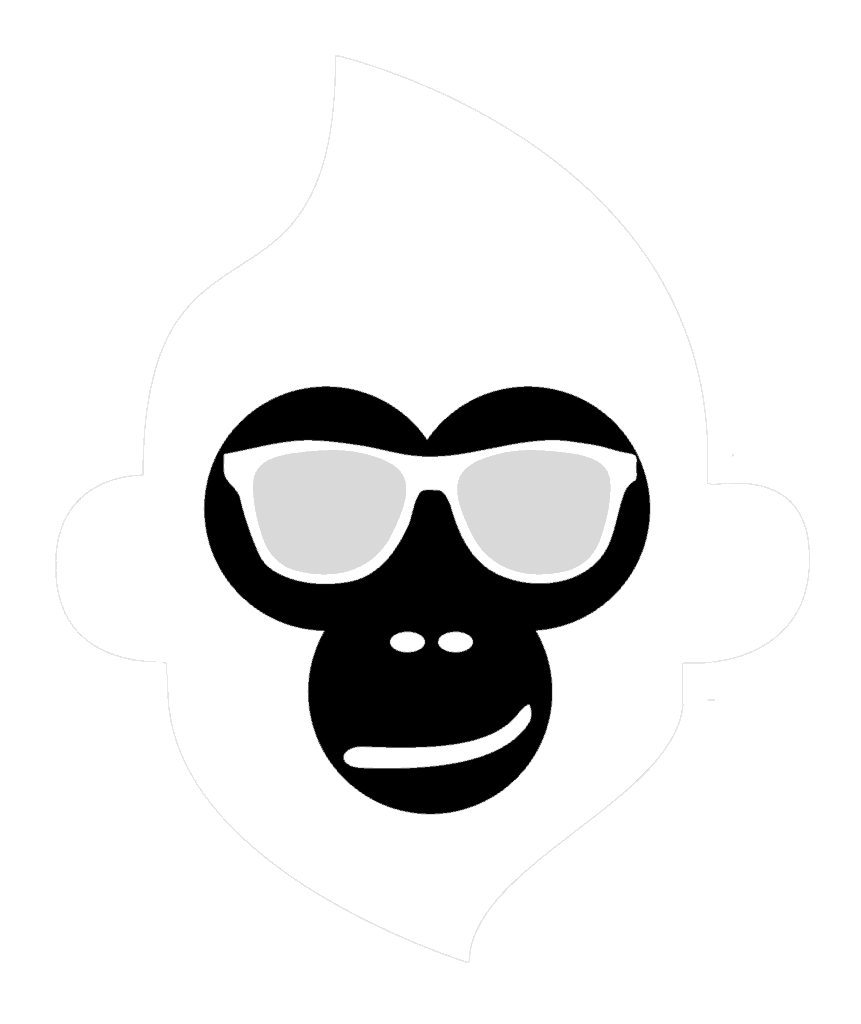
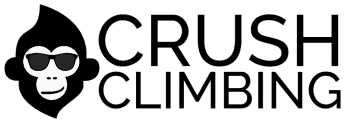
What a thoughtful and intelligent article. Thank-you for reinforicing my decision to not allow my 12 year old to have social media accounts. He will be reading this as homework!
Awesome article!